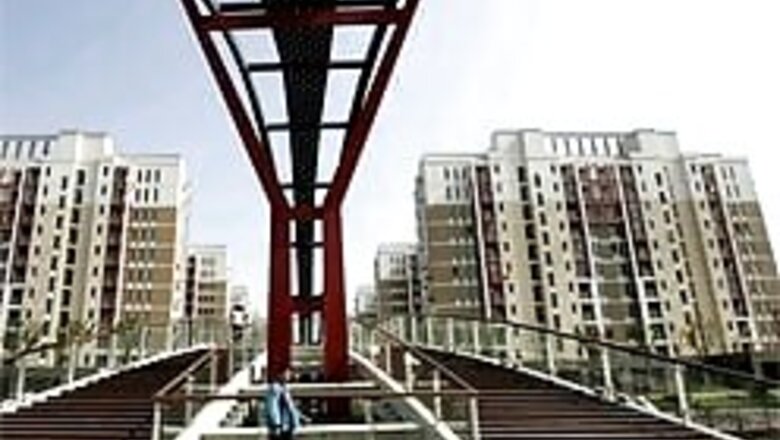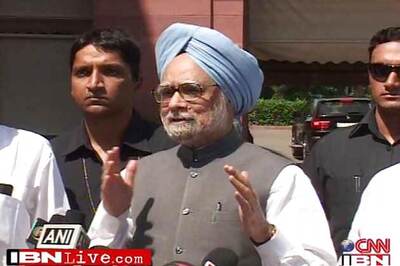
views
New Delhi: When the stock markets fall, there is a lot of collateral impact on many other asset classes, notably the real estate. Already there are reports that real estate prices in many pockets have started to soften because of the stock market crash.
Is that true? Arun Nanda of Mahindra Gesco and Saurav Chawla of DLF have the answers. Arun believes that one may see lesser euphoria among new players while Chawla says that there is no softness in realty prices in North India.
Excerpts from CNBC – TV18’s exclusive interview with Arun Nanda and Saurav Chawla:
Q: Have you seen any softness in any of the markets that you are present in because of the stock market fall?
Nanda: I do not think the retail buyer has been affected because there is no direct correlation.
Our buyers are typically first time home buyers, young professionals who look more at the take home salaries and their ability to service their housing loans. So I have not seen any change there.
Q: In the past though, in 2000, did you see any correlation between what was happening in the market and then what happened with the real estate prices or demand even?
Nanda: If there are speculators who are looking at large chunks of either land or taking positions with company, they are the one who get affected by the stock market because ultimately surplus cash does move between various markets.
But the actual users does not matter. Infact after the last fall in the real estate market, we on the retail side saw growth in the market because it became more affordable.
Two things happened at that time. One, interest rate came down substantially and second, income levels went up and so the ability to service EMI.
I personally do not think there is any direct co-relation between stock markets and real estates for people who buy for their own use.
But I see a change coming in, as there was euphoria that everybody wanted to buy a land and become a real estate developer because they were funded by big investors.
I think with this people will become a little cautious. So one might see some amount of euphoria coming down from the new entrants into the real estate market. Infact this morning I cleared a proposal to acquire a large chunk of land somewhere.
Q: There has been reports that may be prices in some of the Mumbai suburbs have cooled down a bit, maybe in New Mumbai and South Mumbai as well. Are those reports speculative?
Nanda: There is no softening, but people sometimes mix up. For example, in NCPA one flat coming into the secondary market is different from a colony or a housing complex being built by real estate developers like us or DLF.
I do not see any softening on that now; buyers are more driven by individual situations and one might see some change in that. We have properties in both the areas that you mentioned, we see no softening in demand or desire to bring down prices.
PAGE_BREAK
Q: If there is any kind of linkage between the stock market fall and equity prices stabilising? Is it seen more in markets like Mumbai and maybe other pockets of India relatively less impacted by it. Has that been your experience in the past?
Nanda: There is no correlation when it comes down to the actual buyer, there is correlation at a level where people are doing land speculation or investors are coming and buying large chunks of properties, which some of us do not do.
A small developer sometimes brings in an investor to get a cash flow into the system and he might sell him 50-100 flats.
We as a principle do not sell to investors, we sell to the retail because we do not want somebody else to be dealing with the same set of customers that we are dealing with.
So in our situation the co-relation does not exist, our correlation is more on housing loan, interest rates and also as Mr Chawla says, that if the economy continues to grow, if the salary continue to rise, there is a definite demand for houses and the demand-supply gap today is something like 30 million units.
Q: What’s happening in Delhi and northern markets and the markets that DLF is present in? Have you seen any softness at all after the stock market fall?
Chawla: No, not at all. As a matter of fact, prices have gone up. As Arun was saying, for first homebuyers, it really does not affect them in any form.
There is of course some speculative activity in pockets in various regions, and that’s more on the land but not in built up properties as such. So we do not see any slackening in demand. In short, we do not see any price run down as such right now.
Q: What about the collateral damage in terms of what happens in the primary markets? What is DLF’s plan now? Do you plan to delay your IPO, and are you planning to reduce the size?
Chawla: I cannot comment too much on it. But just on the timetable, we still do not have the regulatory approvals in place. So the question of telling delays or postponing the issue does not even arise at this point of time.
Q: For satellite towns in Delhi like Noida and Gurgaon, specifically have you seen any change in pricing?
Chawla: No, not at all. As Arun was saying, the correlation to real estate is more on the macro side, how fast the GDP is growing.
So we believe an eight per cent growth in GDP will surely create demand for both office space and retail space and of course the residential options that the middle class India really wants.
So it is a question of demand and supply over here rather than short-term gyrations in the capital markets, that will drive prices, whether up or down.



















Comments
0 comment